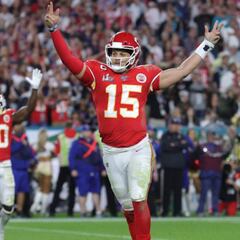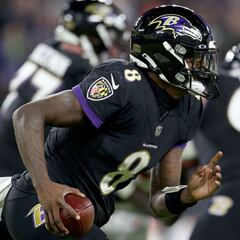What's the problem with Vikings quarterback Kirk Cousins?
Kirk Cousins' performance in Week 12 was confounding, the question is whether the Vikings' quarterback is holding them back from true contention?

Kirk Cousins was brought in by the Minnesota Vikings on a fully guaranteed contract back in 2018, with the belief they were landing a quarterback who put them over the top and one who could help them deliver a first Super Bowl title.
What they actually acquired, however, was perhaps the league's ultimate enigma at quarterback.
Cousins struggles in clutch situations
Nobody could look at Cousins' raw numbers and deem him a bad quarterback. Yet throughout his career both with the Vikings and beforehand in Washington, he is a player who has continued to confound, most notably with an apparent inability to deliver in 'clutch' situations with the game on the line.
Cousins' time as a pro was arguably encapsulated by his showing in Week 12. In the most important game of a season in which he has the best touchdown to interception ratio in the NFL, Cousins came up dismally small, a series of poor throws and a turnover dooming the Vikings to defeat against the San Francisco 49ers.
The Vikings are not without their problems in other areas. However, with the weapons around Cousins, theirs is an infrastructure seemingly conducive to quarterback success.
In terms of his statistics, Cousins has largely succeeded in 2021. Yet baffling performances like the one that dropped the Vikings to 5-6 last week only serve to give rise to the debate around Cousins and whether he is holding his team back.
Cousins' San Francisco slump
Already over 3,000 yards passing with six games still to play, with 23 touchdowns and a career-low three interceptions to his name, statistically the 2021 campaign ranks among Cousins' finest seasons.
Delivering an accurate, well-thrown ball on 80.8 per cent of his pass attempts, above the league average of 78.4, and throwing a pickable pass on 10 out of his 385 attempts, Stats Perform's advanced metrics also reflect well on Cousins.
But it is that apparent season-long consistency that makes displays like his showing against San Francisco all the more bemusing.
Cousins has done an excellent job of taking care of the football this season, yet his third interception of the year came in the third quarter against the Niners as he somehow failed to spot linebacker Azeez Al-Shaair crowding his throwing lane on an attempted pass to Adam Thielen. As far as failures to correctly read the field go, that was as bad as it gets.
OK Azeez! The pick to set up the score and make it 28-14 #49ers. #MINvsSF on FOX pic.twitter.com/MtSlohgB88
— San Francisco 49ers (@49ers) November 28, 2021
That interception set the Niners up to take a 28-14 lead, a gap the Vikings were unable to bridge in large part because of inaccurate throws by Cousins.
He led the Vikings on a touchdown drive on the next series only to then miss a wide-open Justin Jefferson on a two-point conversion try with a low throw.
Jefferson was the target on a fourth-down throw in the fourth quarter that sailed well over his head, that play coming after Minnesota burned a timeout due to Cousins lining up behind the right guard instead of the center.
Cousins is not the first quarterback to accidentally line up in the wrong spot in the heat of the moment, but such a gaffe gives the impression of a signal-caller ill-equipped to deliver when the pressure is at its highest.
And, given the performance of the surrounding weapons, it is no wonder Jefferson was left throwing his arms up in disbelief at some of Cousins' misses.
Stacked Vikings supporting cast
Any thought of Jefferson taking a step back after a historic 2020 season that saw him break the rookie record for receiving yards has been put to bed.
Jefferson is on pace to surpass his tally of 1,400 yards from last year and, among wide receivers with at least 25 targets, he ranks seventh in burn percentage, which measures the rate at which a receiver wins his matchup with a defender on a play where he is targeted, while he is 11th with a big play rate of 39 per cent.
Thielen, who had a pair of touchdowns against San Francisco, has also excelled at creating big plays, doing so on 34.6 per cent of his targets.
With K.J. Osborn emerging as a legitimate third receiving option and Tyler Conklin enjoying a career year at tight end, Cousins possesses one of the best groups of pass-catchers in the NFL and is supported by a run game that has produced 37 runs of 10 yards or more, the 12th-most in the league.
The potential absence of Dalvin Cook with a shoulder injury may reduce the assistance Cousins gets from the ground attack, but he is certainly in no position to complain about a stacked supporting cast, though he may be frustrated by a lack of help from other areas.
The Vikings' fatal flaw
Cousins' sack numbers have drastically improved this season. After taking 39 sacks last year, he has suffered only 15 across 11 games in 2021, pointing to an improvement on the offensive line.
Yet a deeper assessment at the O-Line's performance suggests there may be a hint of fortune about the Vikings' success in preventing sacks.
Indeed, Cousins has attempted 136 passes under pressure, second only to Matt Ryan (145), while the Vikings rank a lowly 28th in pass protection win rate.
More often than not, the Vikings are losing the battle in the trenches, and that is the case on the defensive side of the ball, too.
Continually bullied off the ball by the 49ers' superb rushing attack, the Vikings gave up 208 yards on the ground at an average of 5.3 yards per attempt.
Though San Francisco's run game has dominated several teams this season, the Vikings' inability to stop them was in keeping with a theme of their season.
They rank 26th in opponent yards per play allowed with 5.87 and are giving up 4.83 yards per rush, the most in the NFL. In Stats Perform's rush yards under expected allowed, the Vikings are also 26th.
Minnesota's severe underperformance in containing opposing run games has a two-pronged effect. It has contributed to a defensive effort that has the Vikings giving up 25.1 points per game - with only eight teams conceding more - and allowed opponents to control the clock as the 49ers did last Sunday.
Cousins' inability to make the key throws and that dismal interception undoubtedly played a critical role in Minnesota coming up short in Week 12, but the massive disadvantage in time of possession that resulted from San Francisco's run game dominance, along with a fumble from Cook as he suffered his injury, limited opportunities for the passing game to turn things around.
Related stories
That a quarterback of Cousins' experience and undoubted talents continues to throw in these sporadic head-scratching showings is a legitimate problem for the Vikings. However, they are too infrequent for him to be considered as holding Minnesota back.
The reality is that, between the amount of points they are giving up and Minnesota's ineffectiveness against the run, the Vikings - for all their strengths on offense - aren't in a position to survive Cousins' off days.

